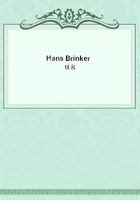
第73章
I leave your house today a happier man than I have been for many a long year. Shall I take the watch?""Certainly, you must, mynheer. It was your son's wish.""Even so," responded the doctor, regarding his treasure with a queer frown, for his face could not throw off its bad habits in an hour, "even so. And now I must be gone. No medicine is needed by my patient, only peace and cheerfulness, and both are here in plenty. Heaven bless you, my good friends! I shall ever be grateful to you.""May Heaven bless you, too, mynheer, and may you soon find the young gentleman," said Dame Brinker earnestly, after hurriedly wiping her eyes upon the corner of her apron.
Raff uttered a hearty, "Amen!" and Gretel threw such a wistful, eager glance at the doctor that he patted her head as he turned to leave the cottage.
Hans went out also.
"When I can serve you, mynheer, I am ready.""Very well, boy," replied Dr. Boekman with peculiar mildness.
"Tell them, within, to say nothing of what has just happened.
Meantime, Hans, when you are with his father, watch his mood.
You have tact. At any moment he may suddenly be able to tell us more.""Trust me for that, mynheer.""Good day, my boy!" cried the doctor as he sprang into his stately coach.
Aha! thought Hans as it rolled away, the meester has more life in him than I thought.
The RaceThe twentieth of December came at last, bringing with it the perfection of winter weather. All over the level landscape lay the warm sunlight. It tried its power on lake, canal, and river, but the ice flashed defiance and showed no sign of melting. The very weathercocks stood still to enjoy the sight. This gave the windmills a holiday. Nearly all the past week they had been whirling briskly; now, being rather out of breath, they rocked lazily in the clear, still air. Catch a windmill working when the weathercocks have nothing to do!
There was an end to grinding, crushing, and sawing for that day.
It was a good thing for the millers near Broek. Long before noon they concluded to take in their sails and go to the race.
Everybody would be there--already the north side of the frozen Ywas bordered with eager spectators. The news of the great skating match had traveled far and wide. Men, women, and children in holiday attire were flocking toward the spot. Some wore furs and wintry cloaks or shawls, but many, consulting their feelings rather than the almanac, were dressed as for an October day.
The site selected for the race was a faultless plain of ice near Amsterdam, on that great arm of the Zuider Zee, which Dutchmen, of course, must call the Eye. The townspeople turned out in large numbers. Strangers to the city deemed it a fine chance to see what was to be seen. Many a peasant from the northward had wisely chosen the twentieth as the day for the next city trading.
It seemed that everybody, young and old, who had wheels, skates, or feet at command had hastened to the scene.
There were the gentry in their coaches, dressed like Parisians, fresh from the boulevards; Amsterdam children in charity uniforms; girls from the Roman Catholic Orphan House, in sable gowns and white headbands; boys from the Burgher Asylum, with their black tights and short-skirted, harlequin coats. *{This is not said in derision. Both the boys and girls of this institution wear garments quartered in red and black, alternately. By making the dress thus conspicuous, the children are, in a measure, deterred from wrongdoing while going about the city. The Burgher Orphan Asylum affords a comfortable home to several hundred boys and girls. Holland is famous for its charitable institutions.} There were old-fashioned gentlemen in cocked hats and velvet knee breeches; old-fashioned ladies, too, in stiff quilted skirts and bodices of dazzling brocade. These were accompanied by servants bearing foot stoves and cloaks.
There were the peasant folk arrayed in every possible Dutch costume, shy young rustics in brazen buckles; simple village maidens concealing their flaxen hair under fillets of gold; women whose long, narrow aprons were stiff with embroidery; women with short corkscrew curls hanging over their foreheads; women with shaved heads and close-fitting caps; and women in striped skirts and windmill bonnets. Men in leather, in homespun, in velvet, and in broadcloth; burghers in model European attire, and burghers in short jackets, wide trousers, and steeple-crowned hats.
There were beautiful Friesland girls in wooden shoes and coarse petticoats, with solid gold crescents encircling their heads, finished at each temple with a golden rosette and hung with lace a century old. Some wore necklaces, pendants, and earrings of the purest gold. Many were content with gilt or even with brass, but it is not an uncommon thing for a Friesland woman to have all the family treasure in her headgear. More than one rustic lass displayed the value of two thousand guilders upon her head that day.
Scattered throughout the crowd were peasants from the Island or Marken, with sabots, black stockings, and the widest of breeches;also women from Marken with short blue petticoats, and black jackets, gaily figured in front. They wore red sleeves, white aprons, and a cap like a bishop's miter over their golden hair.
The children often were as quaint and odd-looking as their elders. In short, one-third of the crowd seemed to have stepped bodily from a collection of Dutch paintings.
Everywhere could be seen tall women and stumpy men, lively-faced girls, and youths whose expression never changed from sunrise to sunset.